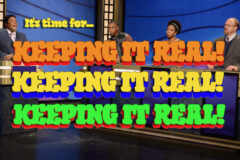When the cocaine-and-sex-fueled bubble of ’80s metal and pop finally burst, grunge was the appropriate sonic hangover. Its sonorous, heroin-influenced sound bed lent itself (wrongly or not) to drifting deeper into one’s own psyche, opening doors to more introspective lyrical themes. Its influence encouraged practitioners of late-’90s nu metal (a moniker that has been heatedly debated since its formation) to tap into primitive emotions and meld them to equally discordant sounds. Instead of depending on tough-guy machismo to sell a song, these paeans were powered by genuine bitterness, self-loathing and rage. Slipknot, Staind and Mudvayne were some of the bands during the era that packaged this blend of raw emotion into rap- and alternative-inflected music that especially appealed to discontented white millennial males, but no one captured the sound of this malaise and primordial damage as adeptly and disturbingly as Korn.
Singer Jonathan Davis, drummer David Silveria (who left the band in 2006), bassist Reginald “Fieldy” Arvizu and guitarists Brian “Head” Welch (who left in 2005 and returned in 2013) and James “Munky” Shaffer joined forces in 1993 in Bakersfield, Calif. Bringing together influences as disparate as Primus, Cypress Hill, Ice Cube, Faith No More, Nine Inch Nails and N.W.A, Korn made its official debut in 1994 with its self-titled debut on Epic/Immortal Records. Like many memorable introductions, the album’s rawness — born of inexperience, youthful enthusiasm and a miniscule budget — is inherent to its disheveled charm: The quintet welded urban beats, off-kilter guitar tunings and slapped bass notes into a dark, frenetic, style that was both uncomfortable and cathartic, for it encouraged listeners to purge the worst of their demons. It didn’t matter that Davis’s frenetic vocals were sometimes indecipherable: His vehement delivery was what truly connected with Korn’s audience.
More than 25 years, 20.6 million traditional album sales and 1.8 billion song streams later (according to Nielsen Music), Korn’s career continues with a North American co-headlining tour with Alice in Chains that starts July 31, and the band is currently working on its 13th studio album. Here are 10 Korn songs that reflect the band’s essence.

Also Read
KEEPING IT REAL — ROUND TWO!
“All in the Family”
It’s not the most popular song from 1998’s Follow the Leader (that honor goes to “Freak on a Leash,” see below”), but the old-school spitting contest between Davis and Limp Bizkit frontman Fred Durst is ridiculously entertaining. It’s packed with juvenile putdowns that grow more raunchy and preposterous by the moment—and would catch hell if the song were released today — with the musical backdrop alternating between Korn’s thunderous rhythms and Bizkit’s quirky bro rap-rock. The singers gleefully swap insults about everything from their bands to their genitals in a rap battle that only a friendship as tight as brothers would permit.
“Here to Stay”
While “Falling Away From Me” (see below) from 1999’s Issues expresses tightly controlled defiance, this foot stomper off 2002’s Untouchables is the explosive result of bottling destructive fury for far too long. The rhythm section and guitars unite for a scratchy new-millennium Wall of Sound that’s as grainy and menacing as the static images permeating the song’s video, which commentates on the steady loop of violence that’s fed to children through the TV. Topped off with a brain-crushing drop at the 3:05 mark, it’s a live-concert favorite can shake the walls of any venue — a likely reason it won the 2002 Grammy for Best Metal Performance.
“Alone I Break”
Korn isn’t known for traditional ballads. They doesn’t have a problem with dropping the tempo, like on Follow the Leader’s “My Gift to You” or the funereal “Tearjerker” from 2005’s See You on the Other Side, but fans play Korn to cope with annihilating breakups, not celebrate rosy courtships. This Untouchables track, with its traditional song structure and hummable melody, closely approximates a serenade, although its lyrics question one’s masculinity when realizing you’re unable to handle dire problems. The group took a minimalist approach to its synthetic beats, guitar parts and almost subliminal bassline to create a hypnotic backdrop.
“Twisted Transistor”
Music as an uplifting force motivates the lead single from See You on the Other Side’s, the first taste of Korn that didn’t feature Head: He left that year after experiencing a religious conversion that saved him from severe drug addiction. Munky’s crunchy chords saw through a delicious booty-shaking rhythm combo courtesy of Fieldy and Silveria that makes it one of the most danceable Korn songs — likely the influence of co-writers The Matrix. Its video further elevated its popularity (it’s Korn’s third-best-selling single), thanks to rappers Lil Jon, Snoop Dogg, Xzibit and David Banner portraying the band in a This Is Spinal Tap-esque clip.
“A.D.I.D.A.S.”
1996 sophomore album Life Is Peachy was filled with sludgy overtones, which was one reason why “A.D.I.D.A.S.” (an acronym for “All Day I Dream About Sex”), a short and snappy ode to an all-consuming habit of lewd daydreaming, stood out. Its blatant admittance of constant longing for pleasure and sitar-like notes were another. The repetitive, almost frantic refrain at the bridge emphasizes the obsessive thoughts about carnal desires, and its blunt pickup line — “I don’t know your fucking name/So what, let’s fuck” — is more than a rock-star come-on: Its cut-to-the-chase delivery lays bare the need for physical satisfaction.
“Shoots and Ladders”
The foreboding artwork of Korn’s premiere album indicated that our primary years aren’t filled with rainbows, unicorns and candy. The record’s “Shoots and Ladders” continued that theme, for it wove lyrics from nursery rhymes like “Ring Around the Rosie” and “London Bridge” into sinister, half-whispered mutterings amid a backdrop of guitar squalls that sound like a howling animal. This is also hands-down the most popular rock song to feature bagpipes, courtesy of Davis, and the whining instrument never sounded so badass. Yet the song’s sinister underpinnings of childhood despair are nothing compared with Korn’s explosive finale, “Daddy” (see below).
“Falling Away From Me”
Korn announced Issues with a bold anthem that set the template for future album openers, like “Here to Stay” and “Right Now” from 2003’s Take a Look in the Mirror. This track — the band’s No. 4 best seller — airs the dire emotional consequences of domestic abuse, led by Head’s eerie, wavering guitar that’s later paired with the insectile whine of Munky’s. They are followed with an ear-walloping chorus that literally exemplifies the lyrics “Beating me down/Beating me, beating me/Down, down/Into the ground.” But the star of the show is the interplay of Silveria’s skittering beats and Fieldy’s thick, cardiac-style bass.
“Freak on a Leash”
Aided by its iconic video that traces the slow-motion trajectory of a bullet, this lament from Follow the Leader about how Davis hated that the industry was destroying his pleasure in making music is beloved by fans: It’s the band’s No. 2-selling song and won 1999’s Grammy for Best Short Form Music Video. The song’s themes of recurring loss forms an observation about the human condition that many of Korn’s fans could relate to. The sparse track climaxes when Davis breaks into madcap scatting that peaks with the command of “Go!,” preceding a sick drop.
“Daddy”
No song proves that the malcontent suffusing Korn’s music stems from genuine trauma more than “Daddy.” The finale to Korn concludes with Davis disintegrating into a tear-drenched primal scream as he recalls the terror of childhood sexual abuse and lambasts those who failed to protect him. Producer Ross Robinson left the tape running as Davis melted down post-performance, capturing every squeal and whimper he emitted as he relived the ordeal. The song is so intense, the band didn’t play it live for 20 years until Davis had exorcized enough demons to perform it during a 2015 tour.
“Blind”
Korn’s album opener actually pre-dates the band’s existence — Davis brought it along with him when he left his former band, SexArt, to join the group. All of the elements that set Korn apart are here: the down-tuned guitars, the five-string bass whose strings sound as loose as rubber bands, catchy hip-hip drum beats infused with metal power, an atmosphere of dark anxiety and Davis’ teeth-gritting growls and breathy whispers. The sparse intro’s tension is ignited when he snarls, “Are you ready?” — a line that can now be seen as ironic, given that masses of disgruntled youth were waiting for something just like Korn.




